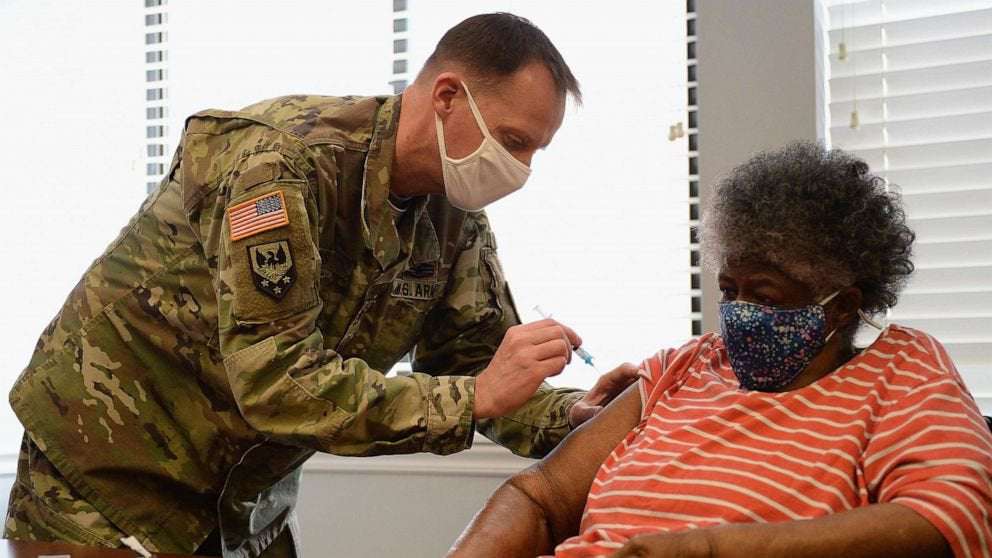The CDC estimates the delta variant accounts for about 10% of new cases.
The delta coronavirus variant is infecting a mounting number of people in rural Kansas and Missouri.
The variant, first detected in India in October, was upgraded by the Centers for Disease Control and Prevention this week from a "variant of interest" to a "variant of concern." The CDC estimates the delta variant accounts for about 10% of new cases in the U.S.
Missouri had the highest percentage of the delta variant at 6.8% of reported cases as of May 22, the latest CDC data.
Data from the CDC shows high community transmission in rural parts of Missouri and Kansas -- regions already struggling with slow vaccination rates.
In southwest Missouri there's been a spike in the number of COVID-19 cases and hospitalizations.
Kendra Findley, the administrator of community health and epidemiology with Green County, said that random testing of virus samples shows increasing cases of the delta strain.
"It shows us that what we've got in the community is a much more infectious variant that we are having to deal with, which shows why we have such an explosion of cases not just in Greene County, but in southwest Missouri," she told the St. Louis Post-Dispatch.
The Missouri Department of Health and Senior Services issued a news release Wednesday saying that the state "is experiencing a rise in individuals contracting the Delta variant," while urging locals to get vaccinated.
Missouri is now leading the nation with the most new COVID-19 cases per 100,000 residents over the last seven days, according to The New York Times tracker.
Mercy Hospital Springfield issued a plea on social media for Missourians to get vaccinated, painting a somber picture of the crisis unfolding at hospitals in the area.
"Bed capacity is strained. ED waits are long. COVID patients are younger, sicker and unvaccinated. Vaccines are free, available and effective. What are you waiting for? 82? 102? 152? What about 1? 1 person you care about? You?" wrote Erik Frederick, Mercy's chief administrative officer chief administrative officer.
In Missouri, 43.4% of the population has initiated vaccination and 37.7% have completed vaccination, according to state data.
The delta variant is becoming a source of growing concern in the neighboring state of Kansas as well.
"The CDC estimates delta accounts for about 10% of new cases [in Kansas]," Amanda Cackler, director of quality and safety at the University of Kansas Health System told Kansas City, Missouri, ABC affiliate KMBC. "We have had and continue to have deaths of patients who have had COVID-19. Our most recent one was on the 12th of June."
In Kansas, 43.6% of the state is vaccinated with one dose and 37.6% are fully vaccinated, according to the state's health department tracker.
Officials, including CDC Director Dr. Rochelle Walensky, said the COVID-19 vaccines protect against all variants and the best way to protect yourself from the delta variant is to get vaccinated.
The pressure is higher than ever to get more of these rural populations inoculated.
"Our biggest concern really is that we're running out of arms, and so it's really trying to get folks in situations where they can get their vaccine because we have plenty of inventory," Cackler told KMBC.
The CDC has identified two regions -- the Midwest and Mountain West states -- as having the estimated largest percentages of new delta variant cases. In the Midwest, which includes Iowa, Kansas, Missouri and Nebraska, the delta strain accounts for 23.5% of all cases, the CDC reported.
Overall, the delta variant has been reported in more than 80 countries, according to the World Health Organization.
Walensky warned Friday that the variant could soon become the dominant strain in the United States.
"I think that that's probably going to be the case," Walensky told "Good Morning America."
Nationally, 53.1% of the U.S. population has received at least one vaccine dose and 44.7% is fully vaccinated, according to CDC data.

JustDiscoveredSex on June 20th, 2021 at 02:14 UTC »
Yeah, NPR did a report on it.
Quoting a doctor at one of the hospitals there:
“I mean, there's a cultural shift in our staff right now. There was this great sense of teamwork and working together in the winter and fall, and now because of the - they know that everyone - every single case we have in the hospital is not vaccinated, they - our staff's exasperated, exasperated by the politics. They're exasperated by Facebook. They're exasperated by the misinformation. They're exasperated by lies. They're frustrated because they know that while we're taking care of all these patients, we have other patients that also need care, and they couldn't be prevented with a vaccine, where these could.”
smoresporno on June 19th, 2021 at 22:30 UTC »
Here in MO, when vaccine started becoming available, our dumbass governor was diverting doses away from population centers and to rural areas. It's bad enough these goobers in the sticks won't get vaccinated, but they purposefully wasted a lot of doses in the early going.
https://www.kmov.com/news/vaccine-supplied-to-rural-missouri-mass-events-sometimes-more-than-demand/article_88bcc218-77cb-11eb-972e-9fc24203c9f1.html
ShambolicShogun on June 19th, 2021 at 22:13 UTC »
Places with the highest concentrations of unvaccinated loons? What possible correlation could there be?